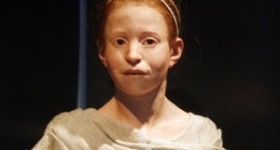Bettany Hughes’ support of Classics
Below is a transcript of Bettany Hughes’ appearance on Woman’s Hour.
Womans Hour, BBC Radio 4
November 16, 2010
“Jenni Murray: Now, even in the sixties, when I was at a state school and
Latin was for everybody (Greek only for the very bright) there were plenty
of mumblings about pupils wasting their time on dead languages when they
could be learning French, German, Spanish and perhaps even Russian or
Chinese. Well, its not on the National Curriculum and only 17% of state
schools teach classics, but there is a new campaign called Classics For
All. One of its leaders is Bettany Hughes, whose latest publication is The
Hemlock Cup: Socrates, Athens and the Search for the Good Life. Bettany,
how would you sell Socrates to a class of 21st-century pupils?
Bettany Hughes: Well, Id tell them that they are living the way they do
because Socrates thought the way he did. The very fact that he says the
unexamined life is not worth living is the reason that they are sitting
in school in the first place, because they are there to learn about life.
So he is intently relevant.
JM: Why are you so passionate about it, that you chose to write your next
major tome about it?
BH: Well, I think he introduces so many things to us
the idea that we need
to ask questions about life: What is good? What is bravery? What is the
point of death? And these are questions that we all ask about ourselves
still today and hes incredibly relevant to our world, because he lived in
this kind of can-do society, 5th century Athens, where everything was
going very well, there was a lot of materialism, they were expanding their
empire. But suddenly, everything collapses, democracy doesnt seem to have
the answer to everything, its not a panacea, and Socrates is almost a
prophet for our age, because he says: what is the point of all of this,
what is the point of glittering statues, city walls and beautiful warships
if those who live in these cities are not happy? So I think he asks an
important question of our time
JM: Which indeed is being asked at this moment, by the Prime Minister.
Alright, now convince this same class that Latin and Greek are worth the
effort.
BH: Well whats interesting
I think my battle would be half-won, if I were
to go into that classroom, erm because we know, Im the President of a
thing called JACT (Joint Association of Classical Teachers) and with
Friends of Classics we did an independent survey and between 70 and 76% of
the pupils we spoke to in 1000 schools all told us that they desperately
wanted to learn classical subjects, they wanted to learn Latin, Greek and
Classical Civilisation. But the terrible situation that were in now is
that between 60 and 70 classics teachers retire every year, only 27 are
being trained, so they are not being met, their desires are not being met.
JM: But did they say, because you know I suspect those of them who had
parents who went through it, the parents who say Oh my goodness, do you
really want to go through, you know, The farmer threw a spear at the
barbarian? for instance, she says, with memory. [chuckles]
BH: Indeed. Amo, amas, amat, and all that. Well I think actually that is
one of the reasons they do want to learn, because they think that this is
this special code-breaking that they as the next generation can do. Er,
they love classical subjects. They go in their thousands, their tens of
thousands, their millions to films about the classical world. This film
about Sparta called The Three Hundred [sic] took 72 million dollars in its
first weekend, and most of those were 14 and 15 year-old kids who were
desperate to find out about the ancient world. So it sparks their
imagination, and actually what is very interesting is that theyre voting
with their feet and theyre saying Please, can you teach us more? We want
to learn.
JM: But when, politically, you find, alright a former-former-former
Education Secretary, Charles Clark, saying Oh, education for its own sake
is a bit dodgy, how do you counter that political view?
BH: [sighs] I mean, thats just daft, isnt it. Because what do we want
out of our next generation? We want them to be enlightened and inspired
and stimulated, surely, we want theirs to be a generation that has open
minds, rather than closed minds. But there are also incredibly practical
results that come out of learning Latin and Greek. Er, most of the
European languages, all of the Romance languages, are based on Latin.
Between 40 and 60% of the words that you and I are speaking now are
Greco-Roman in origin, so actually it makes you a great linguist, to learn
these subjects, and of course it also teaches you about why we live the
way we do. The fact that we have this word democracy, that we have
politics – it is a greek word, politics – helps you to understand the
modern world if you, if you know more vividly, and with more nuance, where
those words and ideas came from.
JM: But how impressed do you think an employer would be, with a kid with
straight-As in Latin, Greek and Ancient History, as opposed to the one
whos done Business, Finance, and I.T.?
BH: The fantastic thing, we have some great statistics, luckily, to back
up our campaign. If you talk to Cambridge University, theyll tell you
that of all their Arts graduates, excluding law students, if you call law
students Arts graduates, classicists are the most highly employable. And
actually, if you go to businesses, across the board, particularly
international businesses, they love a classical degree, because it shows
you can deal with quite complex data, it shows that you have an interest
in the wider world, and it also shows that you have a fundamental interest
in humanity, and increasingly, businesses of all kinds are realising that
thats an absolutely essential skill to have.
JM: How did you get your classical education?
BH: Well, I was very lucky. I got a scholarship to a school where there
were still classics teachers. There were only three of us who learnt I
mean at this time it was very unfashionable, it was on its way out but
they were brilliant teachers: Veronica Anstee and Mary Sergeant and they
inspired us to love this subject. And I think I carried on with it partly
in a slightly bloody-minded way because I thought: this is SO important
and it teaches us so much we cannot allow it to die.
JM: And how do you retain that passion for it?
BH: Because the whole world is in antiquity. If you look to the distant
past, you see yourself and you understand why we live as we do. And apart
from that, there are just fantastic stories in antiquity. I love the fact
that the poet Sappho first described love as bitter-sweet 26 centuries
ago. Although, in fact, she called it sweet-bitter, which is much more
accurate!
JM: But why do people say, Ooeurgh, its such an elitist pursuit, oh, she
had the benefit of a classical education, lah-di-lah-di-lah
BH: Again, isnt that terrible? It was lost from schools partly because
people said: this is an elitist subject. How do you make a subject
elitist? By only teaching it in the most elite schools. So, we know that
state schools across the country are genuinely desperate I get about 100
emails a week from children saying I want to learn more so we set up
this campaign purely so that we can meet that need.
JM: But what about the teachers? I think youre losing about 60 or 70
classics teachers retiring each year. How are you filling up those gaps?
BH: We are, we are losing that number of classics teachers. The good news,
though, is that the numbers of students in universities at the moment are
12,000 studying classical subjects, thats the highest level its been at
for ten years. So actually, in three or four years time, were going to
have a lot of very classically-educated young people who are going to be
available to teach, and what our campaign is going to do is to give grants
to schools who want to invite those new teachers into their schools to do
the work.
JM: Well, Bettany Hughes, thank you very much indeed for being with us.
[plugs BMs book]”



Bethany Hughes appeared in a tv series called ” east to west ” .. Her lack of knowledge of history that is older than Europe was astounding ..
She had no clue abt the rich Dravidian history in india prio to the arrival of the Mughals .. She attributed indias wealth to rich soil … India was the richest soil in the world .. Is that what narco polo said !
Some people have a chip on their shoulder abt ancient Dravidian ( Aryan ) culture … Dravidians developed the basic form of Sanskrit that arrived in india … Bethany also quoted the Mughals as saying that Indians were unattractive .. Bethany throughout history ( ancient history wh u r not familiar with ie more than a thousand yrs ago ) , Persians systematically kidnapped Indian beauties ..
Bethany people line u give historians an image that they r totally biased ..
Bethany ?!